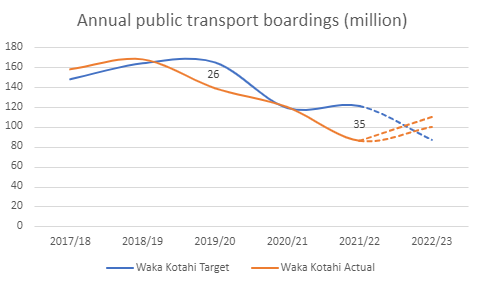The rising cost of transport has been a significant issue for working families in the past year. Working conditions in key occupations like bus and truck drivers remain substandard.
Budget 2023 delivers welcome funding to increase bus driver wages, lower public transport costs, and support decarbonisation.

“This Government has supported significant progress on bus driver wages in the past two years; however, implementation has been inconsistent, and many are still struggling. This Budget needs to ensure funding has been put aside to support the negotiation of Aotearoa’s first Fair Pay Agreement”
– Hayley Courtney, FIRST Union bus organiser
STATE OF THE SECTOR
In the 1980s and 1990s, much of the transport sector was privatised and managed with a market-driven approach. As a result, transportation spending has focused on cars and related infrastructure in recent years.
Transport is one of the most expensive parts of the Budget, accounting for $10.1 billion of total spending in 2023, a $885 million (9.6%) increase from 2022. Funding to the sector since the 2017 Budget has doubled, an average increase of 17% per year. Since 2017, the Labour Government has tried to balance this by increasing funds for rail, public transport, and emissions reductions.
The pandemic catalysed many of the hardships facing public transport, particularly for buses. Low wages, punitive rostering, and split shifts, and poor health and safety have resulted in a retention issue for drivers. Many drivers have left the industry altogether, resulting in a nationwide shortage. Industrial action continues to be a consistent feature of the industry.
We have consistently lobbied Government to abolish the Public Transport Operating Model (PTOM), which rewarded low-paying operators. The Government is currently moving legislation through Parliament to replace PTOM with the Sustainable Public Transport Framework, which emphasises employment as a key focus. At the same time, $61 million in funding allocated in last year’s Climate Emergency Response Fund was used as the basis for a significant increase in driver wages (with co-funding from local government and bus operators) – as much as 20% in some regions.
Unions have also been pushing Government to continue increasing funding to improve bus driver wages and have called on Government to extend half-price and free public transport fares.
BUDGET ACTIONS
In 2023, road funding is still projected to make up the largest part of the Transport Budget, at 67%. While a marked decline from the 83% of 2018, this part of the Budget has seen a 70% increase over this period from $4 billion to $6.8 billion.
Some funding is linked to cyclone recovery spending, with the Government committing $275 million for Waka Kotahi and local councils to fund road repairs. This complements the $250 million in funding announced in the immediate aftermath of the cyclone. $200 million has also been committed to repair damaged rail infrastructure.
The 2023 increase to rail expenditure is modest – up $83 million to $2.2 billion. However, rail funding has trebled from 2018 to 2023, while its overall share of Vote Transport has increased from 14% to 22%.
The new area of emissions reduction funding has doubled, up from $307 million in 2022 to $630 million in 2023. Emissions reduction funding now makes up 6% of Vote Transport and equates to 9% of total road funding.
Public transport is primarily funded through the National Land Transport Programme, where allocated funding has increased by $151 million (24%) to $778 million. Two further initiatives bring the total public transport spend to $955 million.
The Government has set aside $32.1 million for the next year to improve ‘the retention and recruitment of bus drivers through more attractive terms and conditions’. A further $65 million was allocated for subsequent years. We expect this funding will support the implementation of a Fair Pay Agreement in the bus sector.
As part of its cost-of-living response, the Government has committed to free public transport for under-13s and half-price public transport for under-25s. The total cost of this is estimated to be $109 million for 2023/24. This is in addition to the existing allocation for SuperGold Card holders.
CTU ANALYSIS
We are pleased to see initiatives in the emission reduction stream that will improve bus driver wages and make public transport more affordable. These initiatives will also help to support working people with the cost of living and contribute to lower emissions over time.
However, Budget 2023 is also replicating a familiar template, with road spending continuing to crowd out the long-term investment needed in rail and public transport.
While big increases to rail funding in previous years have been maintained, rail funding as a proportion of the Budget has fallen. Meanwhile, total public transport funding remains just shy of 10% of Vote Transport, and 14% of total road funding.
Restricting fare reductions to younger New Zealanders seems a missed opportunity. Post-pandemic ridership has now reached 80% of pre-pandemic levels in Auckland, buoyed along by half-price fares. Waka Kotahi research found, from June to October 2022, a third of public transport users reported journeys that were in some way a result of half-price fares. This suggests investment has encouraged a transport mode shift and more sustainable mobility.
Low-income communities have historically been under-served by public transport. To amend this, the reach and regularity of our public transport network must be expanded. Budget 2023 provides little in the way of initiatives, and Auckland Council is currently implementing a wave of bus service cuts. We need to see sustained investment in building and maintaining a sustainable, inclusive public transport system.
